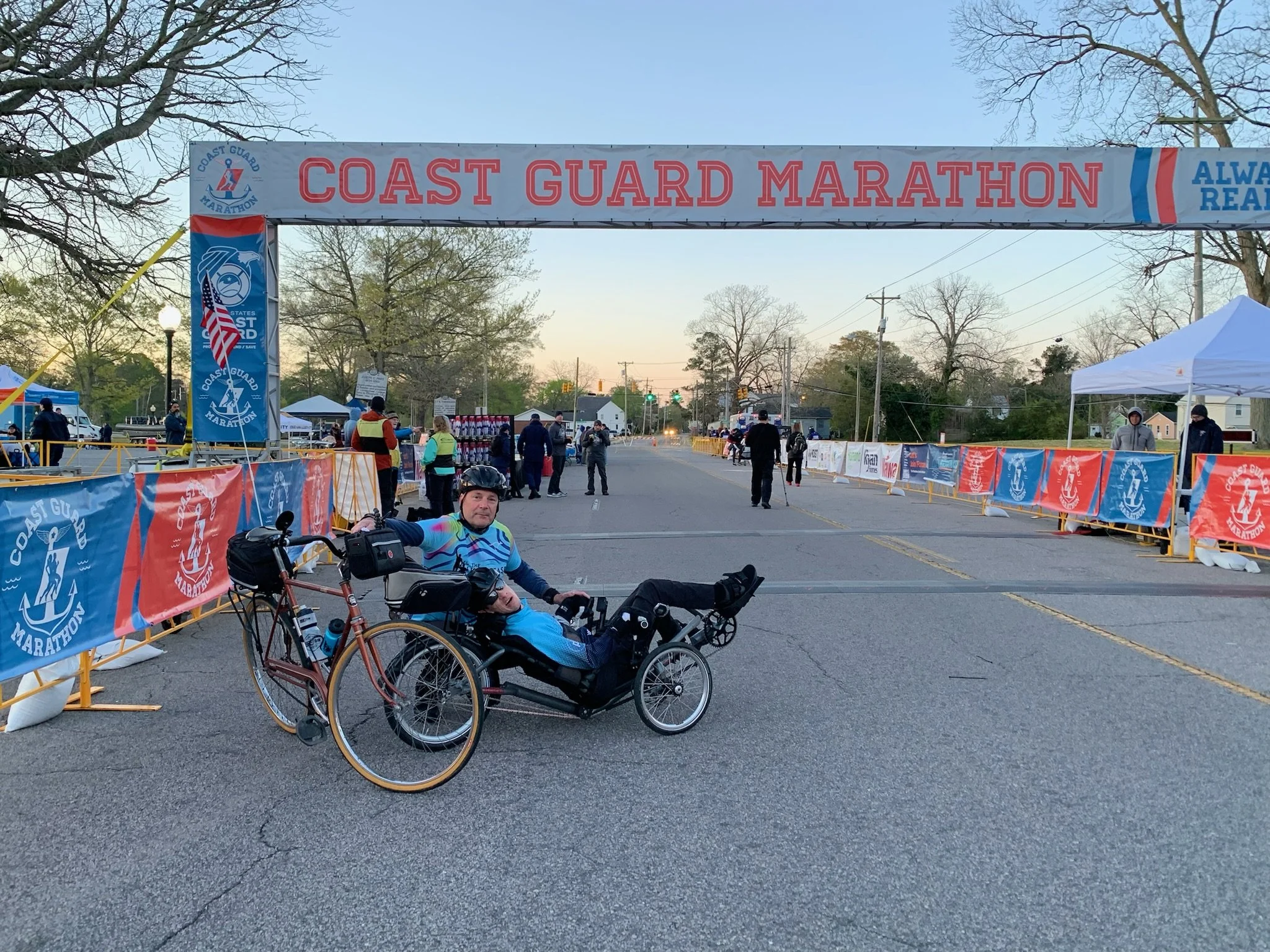No Time To Tie By Kevin Enners
I don’t expect to win all of the races I do. And I don’t. I consider myself lucky to have won the few that I had. I have been competing in road races for over twenty years, and I’m only thirty years old. Typically, at the end of a two-decade career, most people hang up their gear and enjoy relaxing in retirement, never to lace up a running shoe or clip into clipless cycling pedals again. I am, inexplicably, in the minority of athletes who still think they have something to prove. Or maybe I race to hold on to that freedom I feel when I’m on my bike. It’s hard to distinguish between the two.
I was reflecting on this as I sat in the front seat of my dad’s truck which was stuffed with luggage, bikes, and, of course, my manual wheelchair. My German Shepherd companion, Bo, sat behind me sniffing the air that blew through his window, which was slightly cracked. He did his doggy ritual of whining, panting and yawning before he settled down as we hopped on the interstate, bound for the Coast Guard Marathon in North Carolina. It was in this state I had made childhood memories with my Granddad, who served in the Coast Guard during World War II. Fishing, watching old Star Wars movies, and playing ping-pong with my cousins, these memories harken back to fun, simple, carefree times.
I was young when my grandfather was around, so I don’t remember much. What I do remember is Granddad always seemed upbeat, always had a smile on his face, and always seemed at ease living on the water with his fishing boat tied up to the dock in back of his house that had a semi-enclosed deck overlooking the intercoastal waterway. It might not have been grand, but to my kid self, it seemed like a tranquil paradise. Early morning summer sunrises and sunsets smiled on the water which peacefully lapped up against the dock. No expectations. No agendas. We did whatever we felt like doing. Those were my summer vacations.
At my grandfather’s funeral, he was sent off with a twenty-one-gun salute. Afterwards, a pair of Coastguardsmen, in their meticulous blue uniforms and white caps, handed my father a carefully folded American flag. Another approached me, hand in a fist. He unfurled his hand with breathtaking precision. In it was a shell casing fired from one of the guns used in the salute. I couldn’t tear my eyes away from the honor bestowed upon me at that moment. With a knotted chest, I thanked him. He smiled and, with such crispness, he pivoted with quiet pride to rejoin the formation as the group marched away.
This memory spun through my head as I approached the start of the 2024 Coast Guard marathon. Other para-cyclists converged like connecting parts of a macro organism. Suddenly, my heart was hammering. Something was not right. It was my shoe. It felt looser than normal. Oh God, I thought . Not now! My mind was now in panic mode. I tried to shove my foot all the way into the toe of the shoe, allowing myself a small prayer that my foot wouldn’t hop out. Anxiously waiting, I had a fleeting thought that maybe Dad could pop in and tighten it, but then The Star Spangled Banner began to play. The sendoff of the crank division would follow shortly thereafter. There was simply no time to tie my shoe.
My tell-tale heart pounded in my ears as a breeze blew in my face. My Wahoo computer kept shutting down, sensing I was stationary. Barns Courtney blared through my phone speaker. My dad kept pressing the on button on my bike computer as it persisted to hibernate. It seemed like I was in a race against electronics even before the marathon had begun. Let’s just start this thing, I urged telepathically.
My head was on a swivel as I sized up my competition. Para athletes in fast-looking handcycles – which were made of carbon fiber, fitted with huge crank rings that could have been the size of small dinner plates with 20 plus gears. Comparatively, my fifty-tooth chainring, with a simple internal two-speed kick-shift coaster brake hub, looked like it should have been on a kid’s bike. I swallowed; my throat dry. Then, after what seemed like an eternity, we were off, cruising down washed-out asphalt – battered by the elements. The broken roads had an extraterrestrial whitish tint to them, the unnatural complexion of roads crossing beach towns.
“Settle in,” my dad called out from behind me as the sun steadily rose, the sky a blur of orange, yellow and pink. As we crested a small bridge at the beginning, the pack of para athletes strung along, single-file and the contingent of Ansley’s Angels and Team Hoyt were not far behind. I breathed deep, needing to focus. I forbade anyone or anything outside of me to dictate my pace. I wasn’t going to be stupid like last time. Ten miles in, I felt good, like I would be able to maintain my comfortable pace – a cool 6:00 per mile. If I just maintained this, surely, I could put a little mustered on it near the end. However, as the morning shadows fleeted, there was a noticeable change in the wind.
The course cornered sharply onto a barren strip of tarmac near Hanger 7. The whispering wind began to howl, and I suddenly felt a force pushing my Catrike. I fought the headwind, fought to keep my bike straight, yet the strength of the invisible force outmatched mine. I switched to my other gear, kicking and pulling the pedals, hoping it would enable me to punch back. Kick, pull. Kick, pull. Kick, pull. Kick – my foot popped out of my shoe! With my other foot still ceded, I jammed on my break and pulled off. My dad swooped in to lace the shoe back up. Time to tie. But, by then, all bets on winning were lost as the speedy handcranks had been able to form a pace line. I caught up to a couple of stragglers, but the skillful, experienced veterans had already finished as I was about one-hundred minutes into the race.
Along the way, I stopped for shots of Gatorade and water. Thoughts spun threw my mind as I reflected on my race thus far. Why was my pace way off? Why was I breathing heavy? Why did it feel like I was dragging? The turnaround point was near. A rumble of adrenaline electrified my body. Memories at Grandad’s flashed through my brain as I remembered why I was putting myself through this torture. His smile. Fishing on the bay. The flag, the brass shell casing, the pride of serving, the lives lost.
A fire lit within me. My legs were cramping. Pedaling is a dance between athlete and bike. You move, it moves. You move faster, it moves faster. You can’t smash it. You need to play with the pedals, finesse your cadence, adapt. After filling up with Gatorade, I did as such, toggling with the two gears of my internal coaster break.
Still, the last 5k was brutal – perhaps the worst 5k of my life. Choked by emotions, I was struggling to remain level-headed. My ambitious hopes of finishing in 2:15 were squelched. Even 2:30 or 2:40 seemed like longshots. All I could do was continue to grind. But, I had recovered a little, and there was still life within my legs. I had to make the most out of it.
I cautiously upped my cadence, regaining my pace. I veered on a narrow straightaway, steadily approaching the finish. Although the time was well off my target, I gave one last good effort, crossing the line at 2:53:43, much slower than I wanted, but a finishing time among the quadrant of handcycles. Unfortunately, due to some confusion while registering, I was not marked as a crank, so I wasn’t in the awards ceremony.
Regardless, I am honored to have done this race. If nothing else, I got to meet wonderful people and enjoyed a long bike ride on a beautiful, windy day – and, once more, feel that freedom of riding my Catrike.

